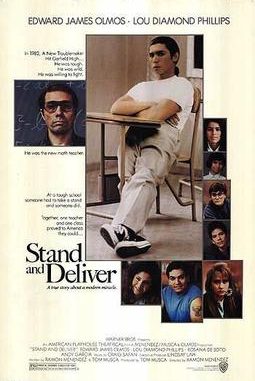
Casey Ryder, Staff Writer |
How would you react if one of your professors told you that in order to pass their class, you must commit to 30 hours of work every week? On top of that, you don’t enjoy the class, and you are someone who is considering dropping out of school. You probably wouldn’t respond too well, right?
However, that is what makes the story of East Los Angeles high school teacher, Jaime Escalante, and his students so remarkable. Escalante, a mathematics teacher at James A. Garfield High School in Los Angeles, manages to take his class of mostly Hispanic students who entered with less knowledge than they should’ve had for their grade level and turn them into scholars in the subject.
In the 1988 film Stand and Deliver, Escalante is depicted by Edward James Olmos, and the film tells the story of Escalante and his pupils.
In year one of teaching his students, Escalante, who is called “Kemo” by his students, teaches a basic algebra course. Too much of the faculty and his students are a lost cause, but Escalante using some unique methods manages to get the students to take an interest in what they are learning. In one of the early scenes of the film, he gives a student half of an apple and asks how much of the apple they are holding, and in another scene, he attempts to teach the class about variables by asking, “How many girlfriends does each gigolo have?”
Escalante is encouraged by what he sees from his students and at a faculty meeting, he asks if he can teach calculus the following year. The hierarchy at the school thought he was crazy but ultimately, they would allow him to teach the class.
This is where the regimen would come into play. First, he would begin teaching the students over the summer and then during the year, the students would come in an hour before school starts, take the class for two periods during the day, and then stay until 5:00 after school. On top of that, the students would be forced to come in on Saturday and there would be no vacation time. All of this would be done in preparation for the Advanced Placement calculus exam at the end of the year, a test so difficult, only two percent of students nationwide even attempt it.
After a year of dedication and hard work, all 18 students pass the exam at the end of the year. But, there’s a twist. Because all of the students allegedly had the same wrong answers, the scores are considered invalid by the Educational Testing Service (ETS).
Since the students are suspected to have cheated on the exam, they meet in a classroom with ETS officials where they enquire about the legitimacy of the test scores. The officials said to the students, “If you cheated, let us know so you can go home and enjoy the rest of your summer.”
Following a period of awkward silence, Angel, one of the wittier characters in the film, gets up to allegedly admit the group’s wrongdoing in what is the most iconic moment of the film. Angel starts out by saying “We’re busted, why don’t we just admit it?” He then claims that he got the test ahead of time and passed it out to everyone. When asked how he got the test he says he got it from the mailman and that “I strangled him his body’s decomposing in my locker!” All of the students in the room erupted with laughter.
Eventually, they retake the exam in the summer and once again all 18 students pass!
If you are aspiring to become a math teacher, this movie is a must-watch. But even if you’re not, I believe it is incredibly heartwarming to see this group of students go from not caring one bit about school in the beginning to passing the Advanced Placement calculus exam in the end because they were willing to put in the work and because they had a teacher who believed in them. If you haven’t already, go watch Stand and Deliver!
Leave a Reply